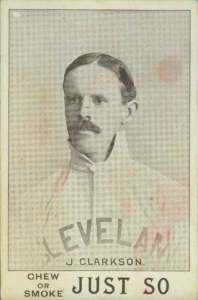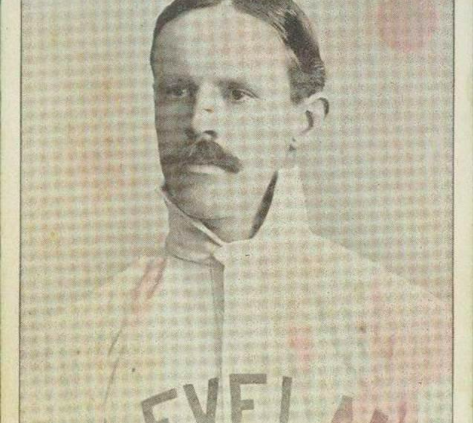May 6, 1892: A ‘Long’ game ends in scoreless tie for Beaneaters and Reds
 The Beaneaters’ first Western road trip of 1892 began in the final days of April. Two games apiece in St. Louis, Chicago, and Louisville preceded their season debut in Cincinnati on Friday, May 6. Losses in St. Louis and Chicago had brought Boston’s record to 14-3.
The Beaneaters’ first Western road trip of 1892 began in the final days of April. Two games apiece in St. Louis, Chicago, and Louisville preceded their season debut in Cincinnati on Friday, May 6. Losses in St. Louis and Chicago had brought Boston’s record to 14-3.
The Reds, at 10-8, had lost three of their last five games, including two in a row to visiting Brooklyn immediately prior to Boston’s arrival.
Two upper-echelon hurlers faced off before a crowd of slightly over 1,900 in Cincinnati’s League Park. In the box for Boston was the great John Clarkson, who in the seven seasons from 1885 to 1891 had topped 30 wins six times, including individual years of 53 and 49 victories. Now, at 30 years old, his star was in the descendant: The 1892 season was to be Clarkson’s last with a winning record (25-16).
Elton “Icebox” Chamberlain, winner of four of his first six starts, took the ball for the Queen City nine. A 32-game winner for St. Louis three years earlier, Chamberlain was only 24 but already in his seventh major-league campaign. With Tony Mullane, he formed an essentially two-man rotation that had started all but three games for the Reds to this point.
Little offense was mounted in the early innings, none of Boston’s first nine batters reaching base, while the Reds, despite a Beaneater error and three walks doled out by Clarkson, could not get a man to second safely. Arlie Latham, beneficiary of a base on balls in the third, tested King Kelly’s throwing arm and was gunned down handily.1
Boston first showed signs of life in its half of the fourth. Herman Long led off with a double and made third on Hugh Duffy’s sacrifice. But Harry Stovey struck out looking, Tommy McCarthy grounded out, and Long was left hanging 90 feet from home.
In the fifth, with two outs, Reds catcher Jerry Harrington and hurler Chamberlain reached on a walk and an error respectively, but the inning ended on a fine play by shortstop Long, who was on his way to an outstanding day in the field. In its half, Boston came even closer to scoring. Bobby Lowe reached on a miscue by shortstop Germany Smith and was sacrificed to second by Kelly. The next batter, Joe Quinn, drove one to right-center, and Reds center fielder Eddie Burke gave chase. Lowe, thinking it looked good for a hit, took off from second. Two nights earlier, Burke and Harrington had crossed paths with Reds pitcher Billy Rhines at a local saloon and, fueled by a goodly intake of liquid spirits, the three held an intramural brawl in an alley outside the establishment. When Captain Charlie Comiskey learned of the late-night fracas, he slapped Burke and Harrington with $100 fines, and Rhines – who was characterized as the aggressor – with a suspension.2 But Burke was up to the task now, snaring Quinn’s drive on the run and then doubling up Lowe at the plate.
The home team’s first hit finally came in the sixth inning: a single by right-fielder Jocko Halligan. But the safety was wasted, as the next batter, Burke, struck out, and Halligan, attempting to steal on the pitch, became the second victim of King Kelly’s strong right arm.
Boston stranded men at second in the seventh and eighth innings. Bid McPhee singled in the Cincinnati eighth and got to second on Stovey’s error, but another snappy assist by Long on a ball off Latham’s bat ended the threat.
Both teams had good chances in the ninth inning but came up short. In the Reds’ half, veteran outfielder Tip O’Neill came to the plate with two outs. He was one of the most consistent hitters of the nineteenth century, batting over .300 in each of the seven previous seasons and twice leading his league. At age 34, however, O’Neill was nearing the end of his string, and it was showing. Assessing his performance in Cincinnati’s May 5 loss to Brooklyn, the Cincinnati Post sneered: “O’Neill played his usual chump game. Take him out, Captain Comiskey, and try Burke.”3
O’Neill waited out Clarkson for a base on balls, and Comiskey himself now had an opportunity to break the deadlock. The captain lofted a fly to center, and it looked as though Duffy would easily squelch the Reds’ hopes. To the surprise of all, though, the ball went through Duffy’s hands. Had O’Neill obeyed the cardinal rule of running hard on any hit ball with two outs, the Reds would have had the game in hand. But it wasn’t so. One paper said O’Neill “stopped at third when he might easily have gone home,”4 another, that he “jogged around to third.”5 At any rate, with men now on first and third, Germany Smith grounded to the ubiquitous Long, and the Reds’ best chance evaporated.
A relieved Hugh Duffy led off Boston’s half6 and, atoning for his muff, singled to left – only the second Boston hit of the game. Stovey, not having his best day either in the field or at the plate, grounded out to Chamberlain, with Duffy taking second. McCarthy’s groundout landed Duffy on third, but the threat died there when Lowe lined out to outfielder O’Neill.
The next potential icebreaker came in the Boston 11th when Clarkson led off with a double to right. This brought up the top of the order and, in the Boston Globe’s felicitous terminology, “it was 20 to 1 that Boston would have shortcake for supper.”7 But Long fouled to Harrington, Duffy’s bid for an infield hit erased Clarkson at third, and Stovey went out on an infield fly.
Chamberlain replicated Clarkson’s feat by leading off the 13th inning with a double, Cincinnati’s fourth and final hit of the day. Attaining third courtesy of McPhee’s sacrifice, he watched helplessly from there as Latham’s liner to left was snared by Stovey.
With one out in the bottom of the 14th, Duffy reached on an error and stole second. He could go no farther, though, as Stovey and McCarthy flied to O’Neill and Halligan for the final two outs of the game.
The game was called before the 15th inning could begin, but not really on account of darkness, though it was so reported in some papers. The Springfield Republican explained: “Finally the sun sank so low that it shone directly into the umpire’s face, and as he could not see the ball he called the game.”8
Player-turned-sportswriter Tim Murnane reserved extraordinary praise for the play of Beaneaters shortstop Herman Long, declaring in the Boston Globe, “His work in this game has never been equalled in the history of base ball.”9 In the game, Long made good on 19 of 20 chances, tallying 14 assists and five putouts, and sharing in two double plays.
Above all, though, this was one of the best pitching duels of the nineteenth century. “Chamberlain and Clarkson,” effused the Boston Journal, “were at their best and gave magnificent exemplifications of the art of pitching.”10 Indeed, Clarkson, the future Hall of Famer, in surrendering four hits and six walks in 14 innings. was actually outdone by Chamberlain, who allowed but three hits and one walk to the mighty Beaneaters. The time of this epic scoreless battle should strike a chord of envy in jaded modern fans accustomed to enduring three, three-and-a-half, or four-hour games as a matter of course. When Umpire Sheridan rang down the curtain after 14 innings, the time of the game went into the books as 2 hours and 20 minutes.11
Sources
In addition to the sources cited in the Notes, the author also consulted the following:
Baseball-Reference.com.
Retrosheet.org.
Nemec, David. Major League Baseball Profiles: 1871-1900, Volumes 1 & 2 (Lincoln, Nebraska: Bison Books, 2011).
Nemec, David. The Great Encyclopedia of 19th-Century Major League Baseball (New York: Donald I. Fine Books, 1997).
Notes
1 “Not a Run Scored,” Boston Globe, May 7, 1892: 5.
2 “Fighting Drunk,” Cincinnati Post, May 5, 1892: 1.
3 Cincinnati Post, May 6, 1892: 7.
4 “A Wonderful Game,” Boston Journal, May 7, 1892: 3.
5 “Not a Run Scored.”
6 At this time, the home team did not automatically bat last, but could choose to go to bat first if so desired.
7 “Not a Run Scored.”
8 Springfield (Massachusetts) Republican, May 7, 1892: 8.
9 “Not a Run Scored.”
10 “To a Standstill, One of the Greatest Pitchers’ Games on Record,” Boston Journal, May 7, 1892: 3.
11 “Not a Run Scored.”
Additional Stats
Boston Beaneaters 0
Cincinnati Reds 0
14 innings
League Ballpark
Cincinnati, OH
Corrections? Additions?
If you can help us improve this game story, contact us.


